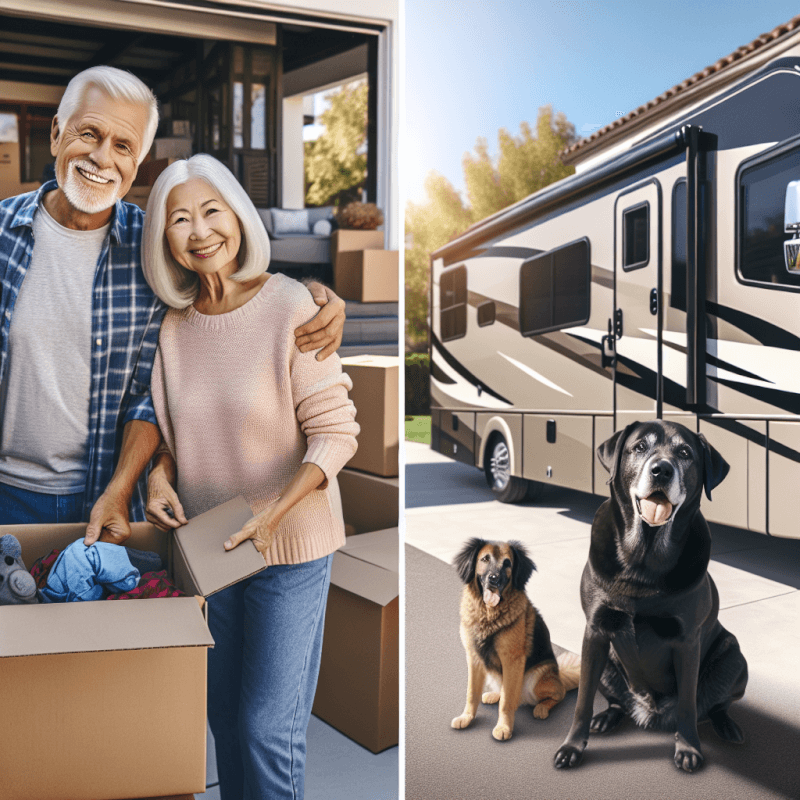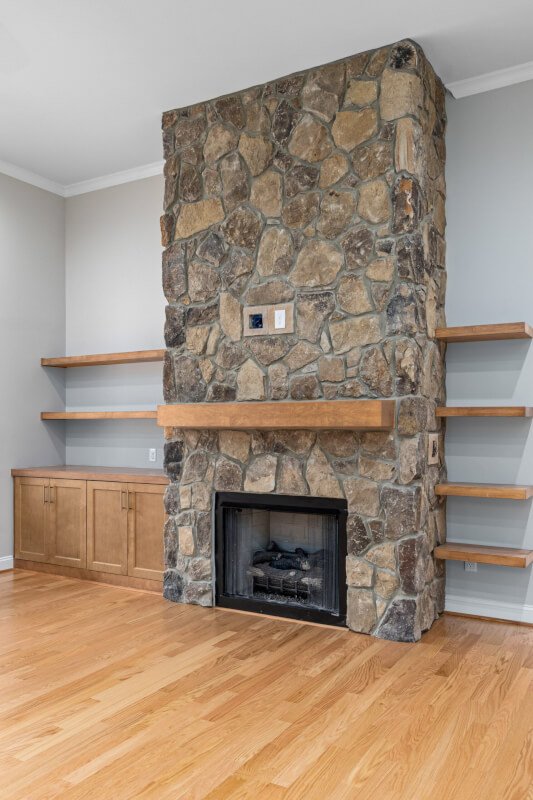So you’re ready to embrace the freedom and adventure that comes with full-time RV living in retirement, but you’re not quite sure how to downsize and prepare for this next chapter in your life. Well, fear not, because we’re here to guide you through the process! In this article, we’ll share some practical tips and helpful advice on downsizing your belongings, organizing your RV, and getting yourself mentally and emotionally prepared for the exciting journey ahead. By the end, you’ll feel empowered and equipped to make the most of your retirement years on the road. Let’s get started!
Choosing the Right RV
Considerations for choosing an RV
When it comes to choosing an RV for full-time living, there are several important considerations to keep in mind. First, think about your desired level of comfort and space. Are you looking for a smaller, more compact RV or do you require more room to accommodate your lifestyle? Consider the number of people who will be living in the RV and their specific needs.
Another important consideration is the type of RV that suits your preferences. Do you prefer the mobility and versatility of a motorhome or the towing convenience of a travel trailer? Each type has its advantages and disadvantages, so it’s important to evaluate your needs and preferences before making a decision.
Deciding on the size and type of RV
Once you’ve determined the general type of RV that suits your needs, you’ll want to consider the size. RVs come in various sizes, from compact and nimble to large and spacious. Think about where you plan to travel and whether you’ll be comfortable maneuvering a larger RV in certain areas.
Additionally, think about the amenities and features you want in your RV. Consider the number of sleeping spaces, kitchen and bathroom facilities, storage capacity, and entertainment options. This will ensure that you choose an RV that aligns with your lifestyle and provides the comfort and functionality you desire.
Researching and test driving RVs
Before making a final decision, it’s crucial to research different RV brands and models. Read reviews, watch video tours, and visit RV dealerships or RV shows to get a firsthand look at the options available. Take note of the features and specifications that are important to you and compare models to find the perfect fit.
Once you’ve narrowed down your choices, it’s time to test drive potential RVs. A test drive will give you a feel for the RV’s handling, comfort, and overall driving experience. Pay attention to the visibility, maneuverability, and ease of operation. This will help you make a more informed decision and ensure that you select an RV that you feel confident and comfortable driving.
Financial Planning
Creating a budget for full-time RV living
One of the first steps in preparing for full-time RV living is creating a budget. Carefully evaluate your financial situation and determine how much you can comfortably afford to spend on RV living expenses. Consider factors such as fuel costs, campsite fees, maintenance and repairs, insurance, groceries, and entertainment.
In addition to these ongoing expenses, it’s also important to factor in initial costs such as purchasing the RV, outfitting it with necessary equipment and supplies, and any modifications or upgrades you may want to make. Creating a comprehensive budget will help you better understand the financial implications of full-time RV living and ensure that you’re financially prepared for this lifestyle.
Selling or renting out your current home
Once you’ve decided to transition to full-time RV living, you’ll need to think about what to do with your current home. For many retirees, selling their home is the most practical option. This not only provides funds for purchasing an RV and covering living expenses, but it also eliminates the responsibilities and costs associated with homeownership.
If you’re not ready to part ways with your home, renting it out can be a viable option. However, keep in mind that being a landlord from the road can present challenges, such as finding reliable tenants and managing the property from a distance. Consider the pros and cons of renting out your home and weigh them against your personal circumstances and preferences.
Evaluating insurance options for your RV
Before hitting the road, it’s important to ensure that your RV is adequately insured. Research different insurance providers and policies to find one that suits your needs. Look for coverage options that protect against potential risks such as accidents, theft, liability, and damage to personal belongings.
Consider additional coverage for specialized equipment, such as solar panels or satellite dishes, and any valuable possessions you plan to keep in your RV. It’s also important to understand the terms and conditions of your insurance policy, including deductible amounts, coverage limits, and any exclusions or restrictions.

Downsizing and Decluttering
Assessing your belongings
Downsizing and decluttering are essential steps in preparing for full-time RV living. Take some time to assess your belongings and determine what you truly need and value. Consider the amount of storage space available in your RV and prioritize the items that are most important to you.
Start by going through one room at a time and evaluating each item. Ask yourself if you’ve used it recently, if it holds sentimental value, or if it serves a practical purpose. Be realistic about what you can and cannot bring with you on the road. Remember that downsizing is about simplifying your life and embracing a minimalist mindset.
Sorting items into keep, sell, donate, and toss categories
As you assess your belongings, sort them into different categories to make the downsizing process easier. Start with the items you definitely want to keep and allocate a designated space in your RV for them. Consider investing in space-saving storage solutions to maximize every inch of available storage.
Next, identify items that you can sell. Host a garage sale, list items online, or consider consignment stores to earn some extra money and help lighten your load. For items that are still in good condition but no longer serve you, consider donating them to charity. Finally, dispose of any items that are damaged, broken, or simply no longer usable.
Organizing and packing belongings
Once you’ve sorted your belongings, it’s time to organize and pack them efficiently for life on the road. Invest in storage containers and bins that fit well in your RV’s storage compartments. Utilize stackable containers, collapsible storage solutions, and vacuum storage bags to maximize space.
When packing, consider grouping items together by category or frequency of use. This will make it easier to find and access what you need. Label containers clearly to avoid unnecessary rummaging, and consider creating an inventory of your belongings to keep track of everything.
Handling Important Documents and Mail
Forwarding mail to a new address
When transitioning to full-time RV living, it’s crucial to establish a plan for handling your mail. One option is to set up mail forwarding with the postal service. This allows you to have your mail sent to a predetermined address, such as a trusted friend or family member’s home or a mail forwarding service.
Before opting for mail forwarding, it’s important to update your address with the necessary institutions and organizations, including banks, insurance providers, and government agencies. Consider switching to electronic billing and statements whenever possible to reduce the amount of physical mail you receive.
Digitizing important documents
Another critical step in preparing for life on the road is digitizing important documents. Scan and save important documents such as identification cards, passports, insurance policies, and medical records to a secure digital storage system. In addition to saving space, this ensures that you have access to these documents even if the physical copies get lost or damaged.
Consider creating backup copies and storing them in multiple locations, such as a USB drive or cloud storage. It’s also a good idea to carry hard copies of essential documents, such as driver’s licenses and vehicle registrations, in case digital access is unavailable.
Setting up a virtual mailbox
For those who want a more organized and convenient solution for handling mail on the road, setting up a virtual mailbox can be a game-changer. A virtual mailbox allows you to receive and manage your mail online, regardless of your physical location.
With a virtual mailbox service, your mail is sent to a secure facility where it is scanned and uploaded to a digital platform. From there, you can view and manage your mail electronically, forwarding it to your desired location or requesting physical mail to be shipped to you. This eliminates the need for mail forwarding and provides greater flexibility and control over your mail.

Preparing for Life on the Road
Researching and choosing campgrounds and RV parks
One exciting aspect of full-time RV living is the ability to travel and explore different areas. Take the time to research and choose campgrounds and RV parks that align with your preferences and needs. Consider factors such as location, amenities, fees, and accessibility.
Look for campgrounds and parks that offer the amenities and facilities you desire, such as full hookups, laundry facilities, recreational areas, and pet-friendly policies. Read reviews and seek recommendations from fellow RVers to ensure that you’re selecting reputable and enjoyable places to stay.
Understanding campground rules and regulations
Before settling in at a campground or RV park, familiarize yourself with their rules and regulations. Each location may have specific policies regarding noise levels, pet restrictions, visitor policies, and length of stay. Adhering to these rules ensures a harmonious and enjoyable experience for both you and your fellow campers.
Take note of check-in and check-out times, as well as any specific procedures for making reservations or extending your stay. Understanding and respecting the campground’s rules will help you maintain a positive relationship with the campground staff and fellow campers.
Developing a travel itinerary
As you embark on your full-time RV adventure, consider creating a travel itinerary. This is especially important if you have specific destinations or attractions you’d like to visit. Plan your route, taking into account driving distances, preferred travel times, and points of interest along the way.
However, it’s also important to allow for flexibility in your itinerary. Spontaneous detours and new discoveries are part of the joy of RV living. Leave room for unexpected adventures and be open to changing your plans based on weather conditions, recommendations from other travelers, or personal preferences.
Learning Basic RV Maintenance
Understanding basic RV systems
Learning the basics of RV maintenance is essential for a smooth and enjoyable full-time RV living experience. Take the time to familiarize yourself with your RV’s various systems, such as electrical, plumbing, heating, and air conditioning. Understand how each system works and know how to troubleshoot common issues that may arise.
Read your RV’s owner’s manual and consult online resources or books dedicated to RV maintenance. Consider attending workshops or joining online forums where you can learn from experienced RVers and ask questions.
Learning how to perform routine maintenance checks
Regular maintenance checks are crucial for the longevity and functionality of your RV. Develop a routine maintenance checklist and make it a habit to inspect your RV regularly. This includes checking tire pressure, fluid levels, battery condition, and the overall condition of your RV’s exterior.
Learn how to perform basic maintenance tasks such as changing filters, lubricating moving parts, and cleaning vents and appliances. These routine checks and tasks will help prevent major issues and ensure that your RV is always in top shape for your travels.
Seeking professional maintenance and repairs when needed
While it’s important to understand basic RV maintenance, there will be times when professional assistance and repairs are necessary. Establish a relationship with a reputable RV service center or mechanic who specializes in RV repairs. Research their qualifications and reviews to ensure you’re entrusting your RV to capable hands.
Don’t hesitate to seek professional help if you encounter a problem that goes beyond your knowledge or capabilities. Ignoring or attempting to fix complex issues on your own can potentially cause further damage and lead to costly repairs down the road. Knowing when to ask for help is essential for maintaining your RV’s condition and your peace of mind.

Creating a Safety Plan
Equipping your RV with safety essentials
Safety should be a top priority as you prepare for full-time RV living. Equip your RV with essential safety items to ensure your well-being on the road. These can include fire extinguishers, smoke detectors, carbon monoxide detectors, first aid kits, emergency road kits, and a weather radio.
Invest in a high-quality tire pressure monitoring system to help prevent tire blowouts and ensure optimal tire performance. Consider installing security measures such as a reliable alarm system, sturdy locks, and wheel immobilizers to protect your RV from theft.
Understanding emergency procedures and protocols
In case of emergencies or unexpected events, it’s important to have a clear understanding of emergency procedures and protocols. Familiarize yourself with your RV’s emergency exits and escape routes, as well as how to operate safety features such as propane and electrical shutoffs.
Create an emergency plan that includes designated meeting points in case of separation or evacuation. Discuss and rehearse the plan with your travel companions to ensure everyone knows what to do in different emergency scenarios.
Keeping emergency contact information readily available
In the event of an emergency, having easy access to important contact information can make a significant difference. Create a list of emergency contacts, including family members, doctors, insurance providers, and roadside assistance services. Keep a printed copy in your RV and save a digital version on your phone or in cloud storage.
It’s also a good idea to memorize or have readily available the phone numbers for emergency services in the areas you’ll be traveling through. Having this information easily accessible will give you peace of mind and help facilitate a swift response in case of an emergency.
Adapting to a Minimalist Lifestyle
Embracing a simpler way of life
Transitioning to full-time RV living often requires embracing a minimalist lifestyle. Letting go of unnecessary possessions and excess belongings can be liberating and open up opportunities for new experiences. Embrace the freedom and simplicity that comes with living in a smaller space and focus on the experiences and memories you’ll create on the road.
Shift your mindset from accumulating material possessions to valuing experiences and relationships. Emphasize the things that truly matter, such as personal connections, nature, and personal growth. Embracing a minimalist lifestyle will not only simplify your physical surroundings but also declutter your mind and enhance your overall well-being.
Maximizing storage space in your RV
Maximizing storage space is crucial when living in an RV. Get creative with storage solutions to make the most of every nook and cranny. Utilize under-bed storage containers, hanging organizers, and collapsible or stackable storage bins.
Consider investing in multi-purpose furniture that doubles as storage, such as ottomans with hidden compartments or dining tables with built-in drawers. Use vertical space effectively by installing hooks and shelves. With careful planning and organization, you’ll be amazed at how much you can fit into your RV.
Developing minimalistic habits
In addition to physical decluttering, developing minimalistic habits can further enhance your full-time RV living experience. Practice mindful consumption by carefully considering purchases and only buying items that truly add value to your life on the road.
Adopt a “one in, one out” rule to maintain a manageable amount of possessions in your RV. Whenever you acquire a new item, make a conscious effort to let go of something you no longer need or use. This helps prevent clutter from accumulating and promotes a mindful approach to what you bring into your living space.

Staying Connected on the Road
Researching internet and cell phone options for RV living
Staying connected while on the road is important for many full-time RVers. Research different internet and cell phone options to find a plan that suits your needs and provides reliable coverage in the areas you plan to travel.
Consider options such as mobile hotspot devices, satellite internet, or utilizing your smartphone as a Wi-Fi hotspot. Compare providers, plans, and pricing to ensure that you have a consistent and reliable internet connection to meet your communication and entertainment needs.
Finding Wi-Fi hotspots and RV-friendly locations
While many RV parks and campgrounds offer Wi-Fi, the quality and reliability may vary. Research and identify alternative Wi-Fi hotspots in the areas you plan to visit, such as libraries, coffee shops, or RV-friendly businesses. Many cities also offer free Wi-Fi in public spaces.
Utilize apps and websites specifically designed for RVers to find RV-friendly locations that provide reliable internet access. These resources can help you plan your travels around areas with strong Wi-Fi signals, ensuring that you can stay connected and productive while on the road.
Using technology to stay connected with family and friends
Technology can bridge the distance between you and your loved ones while living in an RV. Take advantage of video calling apps and social media platforms to stay connected with family and friends. Schedule regular video chats or online gatherings to maintain strong bonds and share your RV adventures.
Consider starting a travel blog or social media account where you can document and share your experiences with loved ones and fellow travelers. These platforms not only keep you connected but also provide an opportunity to inspire and connect with others who share your passion for RV living.
Building a Support Network
Connecting with other RVers and joining RV clubs
Connecting with other RVers can provide valuable support, advice, and a sense of community while on the road. Join online forums and social media groups dedicated to RV living to ask questions, share experiences, and learn from others’ journeys.
Consider joining RV clubs and associations that offer resources, discounts, and organized events for RVers. These clubs provide opportunities to connect with like-minded individuals, attend rallies, and participate in educational workshops.
Attending RV rallies and events
Attending RV rallies and events is a great way to meet fellow RVers and immerse yourself in the RV community. These gatherings often feature educational seminars, vendor exhibits, and social activities. Take advantage of these networking opportunities to build connections, make friends, and learn from experienced RVers.
Research and sign up for rallies and events that align with your interests and travel plans. Whether it’s a large-scale national rally or a smaller regional gathering, these events offer a chance to share stories, gather valuable information, and create lasting memories.
Seeking advice and assistance from experienced RVers
Experienced RVers can be an invaluable source of knowledge and support. Don’t be afraid to reach out to fellow RVers for advice or assistance when facing challenges or unfamiliar situations. Whether it’s a mechanical issue, campground recommendation, or navigating new territory, experienced RVers are often more than willing to lend a helping hand.
Utilize online resources, such as RVing blogs and YouTube channels, to learn from others’ experiences. Many full-time RVers share their tips, tricks, and insights to help newcomers navigate the world of RV living. Learn from their wisdom, but also remember to trust your own instincts and tailor their advice to your unique situation.
As you embark on your full-time RV living journey, remember to approach each step with excitement and open-mindedness. This lifestyle offers the opportunity for adventure, freedom, and a fresh perspective. Embrace the challenges and rewards that come with downsizing, preparing, and adapting to life on the road. With careful planning, a spirit of adventure, and a friendly support network, you’ll be well on your way to enjoying the freedom and joy of full-time RV living in retirement.



